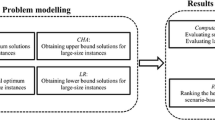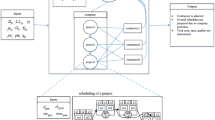Abstract
In enterprise project management systems, a program at the tactical level coordinates and manages multiple projects at the operational level. There are close relationships between multiple projects in a program, which are typically manifested as shared resources and precedence relationships. Most research efforts have concentrated on the resource sharing by projects, while the precedence relationships between projects have yet to be comprehensively investigated. In this paper, a bi-objective hierarchical resource-constrained program scheduling problem proposed, where both resource sharing and precedence relationships between projects are considered in a distributed environment. The problem contains two different sub-problems at the operational level and the tactical level, and they are modeled in the same way as two bi-objective multi-mode scheduling problems. Shared resources are allocated from the tactical level to the operational level, and once they are allocated to a project, they can only be re-allocated to other projects once the current project is finished. Subsequently, a two-phase algorithm based on NSGA-III is developed. The algorithm runs at the operational level and the tactical level in turn. According to the Pareto fronts of projects that are submitted from the operational level, the bi-objective program planning at the tactical level is conducted under the constraints of precedence relationships and shared resources. The results of computational simulations demonstrate the satisfactory performance of the improved algorithm. By coordinating the local optimization of projects and the global optimization of the program in a hierarchical framework, the method proposed in this paper provides an effective integrated scheduling method for decision-makers at various levels of a program.






Similar content being viewed by others
References
Adhau, S., Mittal, M. L., & Mittal, A. (2013). A multi-agent system for decentralized multi-project scheduling with resource transfers. International Journal of Production Economics, 146(2), 646–661.
Agnetis, A., Briand, C., Ngueveu, S. U., & Šůcha, P. (2020). Price of anarchy and price of stability in multi-agent project scheduling. Annals of Operations Research, 285(1), 97–119.
Asta, S., Karapetyan, D., Kheiri, A., et al. (2016). Combining monte-carlo and hyper-heuristic methods for the multi-mode resource constrained multi-project scheduling problem. Information Sciences, 373, 476–498.
Ben, I. S., Patterson, R. A., & Tu, Y. (2020). Solving resource-constrained multi-project environment under different activity assumptions. International Journal of Production Economics, 232, 107936.
Beşikci, U., Bilge, Ü., & Ulusoy, G. (2013). Resource dedication problem in a multi-project environment. Flexible Services and Manufacturing Journal, 25(1–2), 206–229.
Beşikci, U., Bilge, Ü., & Ulusoy, G. (2015). Multi-mode resource constrained multi-project scheduling and resource portfolio problem. European Journal of Operational Research, 240(1), 22–31.
Beşikçi, U., Bilge, Ü., & Ulusoy, G. (2019). Resource portfolio problem under relaxed resource dedication policy in multi-mode multi-project scheduling. International Journal of Mathematics in Operational Research, 14(4), 541–567.
Browning, T. R., & Yassine, A. A. (2010). Resource-constrained multi-project scheduling: Priority rule performance revisited. International Journal of Production Economics, 126(2), 212–228.
Burgess, A. R., & Killebrew, J. B. (1962). Variation in activity level on a cyclical arrow diagram. Journal of Industrial Engineering, 13(2), 76–83.
Can, A., & Ulusoy, G. (2014). Multi-project scheduling with two-stage decomposition. Annals of Operations Research, 217(1), 95–116.
Caramia, M. (2020). Project management and scheduling. Annals of Operations Research, 285(1), 1–8.
Chiu, H. N., & Tsai, D. M. (2002). An efficient search procedure for the resource-constrained multi-project scheduling problem with discounted cash flows. Construction Management and Economics, 20(1), 55–66.
Confessore G, Giordani S, Rismondo S (2002) An auction based approach in decentralized project scheduling. In: Proceedings of the 8th international workshop on project management and scheduling (pp. 110–113). Valencia, Spain.
Confessore, G., Giordani, S., & Rismondo, S. (2007). A market-based multi-agent system model for decentralized multi-project scheduling. Annals of Operations Research, 150(1), 115–135.
Das, I., & Dennis, J. E. (1998). Normal-boundary intersection: A new method for generating the Pareto surface in nonlinear multicriteria optimization problems. SIAM Journal on Optimization, 8(3), 631–657.
Deb, K. (2002). A fast elitist non-dominated sorting genetic algorithm for multi-objective optimization: NSGA-2. IEEE Transactions on Evolutionary Computation, 6(2), 182–197.
Deb, K., & Jain, H. (2014). An evolutionary many-objective optimization algorithm using reference-point-based nondominated sorting approach, part I: Solving problems with box constraints. IEEE Transactions on Evolutionary Computation, 18(4), 577–601.
Deckro, R. F., Winkofsky, E. P., Hebert, J. E., & Gagnon, R. (1991). A decomposition approach to multi-project scheduling. European Journal of Operational Research, 51(1), 110–118.
Delgoshaei, A., Rabczuk, T., Ali, A., & Ariffin, M. K. A. (2017). An applicable method for modifying over-allocated multi-mode resource constraint schedules in the presence of preemptive resources. Annals of Operations Research, 259(1–2), 85–117.
Dixit, V., & Tiwari, M. K. (2019). Project portfolio selection and scheduling optimization based on risk measure: A conditional value at risk approach. Annals of Operations Research, 285, 9–33.
Elimam, A. A., & Dodin, B. (2013). Project scheduling in optimizing integrated supply chain operations. European Journal of Operational Research, 224(3), 530–541.
Fendley, L. G. (1968). Towards the development of a complete multi-project scheduling system. Journal of Industrial Engineering, 19, 505–515.
Fink, A., & Homberger, J. (2015). Decentralized multi-project scheduling. Handbook on Project Management and Scheduling (pp. 685–706). Springer.
Gaddie, S. (2003). Enterprise programme management: Connecting strategic planning to project delivery. Journal of Facilities Management, 2(2), 177–191.
Geiger, M. J. (2017). A multi-threaded local search algorithm and computer implementation for the multi-mode, resource-constrained multi-project scheduling problem. European Journal of Operational Research, 256(3), 729–741.
Gonçalves, J. F., Mendes, J. J., & Resende, M. G. (2008). A genetic algorithm for the resource constrained multi-project scheduling problem. European Journal of Operational Research, 189(3), 1171–1190.
Hans, E. W., Herroelen, W., Leus, R., & Wullink, G. (2007). A hierarchical approach to multi-project planning under uncertainty. Omega, 35(5), 563–577.
Hartmann, S. (2001). Project scheduling with multiple modes: A genetic algorithm. Annals of Operations Research, 102(1–4), 111–135.
Homberger, J. (2007). A multi-agent system for the decentralized resource-constrained multi-project scheduling problem. International Transactions in Operational Research, 14(6), 565–589.
Homberger, J., & Fink, A. (2017). Generic negotiation mechanisms with side payments-Design, analysis and application for decentralized resource-constrained multi-project scheduling problems. European Journal of Operational Research, 261(3), 1001–1012.
Kazemipoor, H., Tavakkoli-Moghaddam, R., Shahnazari-Shahrezaei, P., & Azaron, A. (2013). A differential evolution algorithm to solve multi-skilled project portfolio scheduling problems. The International Journal of Advanced Manufacturing Technology, 64(5–8), 1099–1111.
Kolisch, R., & Drexl, A. (1997). Local search for nonpreemptive multi-mode resource-constrained project scheduling. IIE Transactions, 29(11), 987–999.
Kolisch, R., & Sprecher, A. (1997). PSPLIB-a project scheduling problem library: OR software-ORSEP operations research software exchange program. European Journal of Operational Research, 96(1), 205–216.
Krüger, D., & Scholl, A. (2009). A heuristic solution framework for the resource constrained (multi-) project scheduling problem with sequence-dependent transfer times. European Journal of Operational Research, 197(2), 492–508.
Kurtulus, I. (1985). Multiproject scheduling: Analysis of scheduling strategies under unequal delay penalties. Journal of Operations Management, 5(3), 291–307.
Lau, S. K., Huang, G. Q., Mak, K. L., & Liang, L. (2005a). Distributed project scheduling with information sharing in supply chains: Part I—an agent-based negotiation model. Intern J Prod Res, 43(22), 4813–4838.
Lau, S. K., Huang, G. Q., Mak, K. L., & Liang, L. (2005b). Distributed project scheduling with information sharing in supply chains: Part II—theoretical analysis and computational study. Intern J Prod Res, 43(23), 4899–4927.
Lau, S. K., Huang, G. Q., Mak, K. L., & Liang, L. (2006). Agent-based modeling of supply chains for distributed scheduling. IEEE Trans Syst Man Cybern A Syst Hum, 36(5), 847–861.
Lawrence, S. R., & Morton, T. E. (1993). Resource-constrained multi-project scheduling with tardy costs: Comparing myopic, bottleneck, and resource pricing heuristics. European Journal of Operational Research, 64(2), 168–187.
Liu, Q., Lin, K., Zhang, C. Y., & Zhu, H. P. (2012). Multi-project robust scheduling based on critical chain. Computer Integrated Manufacturing Systems, 18(4), 813–820. (in chinese).
Lova, A., & Tormos, P. (2001). Analysis of scheduling schemes and heuristic rules performance in resource-constrained multiproject scheduling. Annals of Operations Research, 102(1–4), 263–286.
Lycett, M., Rassau, A., & Danson, J. (2004). Programme management: A critical review. International Journal of Project Management, 22(4), 289–299.
Martinsuo, M., & Hoverfalt, P. (2017). Change program management: Toward a capability for managing value-oriented, integrated multi-project change in its context. International Journal of Project Management, 36(1), 134–146.
Maylor, H., Brady, T., Cooke-Davies, T., & Hodgson, D. (2006). From projectification to programmification. International Journal of Project Management, 24(8), 663–674.
Mohanty, R. U., & Siddiq, M. K. (1989). Multiple projects-multiple resources-constrained scheduling: Some studies. The International Journal of Production Research, 27(2), 261–280.
Okada, I., Weng, W., Yang, W., & Fujimura, S. (2016). A genetic algorithm with local search using activity list characteristics for solving resource-constrained multiproject scheduling problem. IEEJ Transactions on Electrical and Electronic Engineering, 11, S34–S43.
Peng, W., Huang, M., & Yongping, H. (2015). A multi-mode critical chain scheduling method based on priority rules. Production Planning and Control, 26(12), 1011–1024.
Rostami, M., & Bagherpour, M. (2020). A lagrangian relaxation algorithm for facility location of resource-constrained decentralized multi-project scheduling problems. Operational Research, 20, 857–897.
Seada, H., & Deb, K. (2015). U-NSGA-III: A unified evolutionary optimization procedure for single, multiple, and many objectives: Proof-of-principle results. In: International conference on evolutionary multi-criterion optimization (pp. 34–49). Springer, Cham.
Shen, W., Wang, L., & Hao, Q. (2006). Agent-based distributed manufacturing process planning and scheduling: A state-of-the-art survey. IEEE Transactions on Systems, Man, and Cybernetics, Part C (applications and Reviews), 36(4), 563–577.
Sonmez, R., & Uysal, F. (2014). Backward-forward hybrid genetic algorithm for resource-constrained multiproject scheduling problem. Journal of Computing in Civil Engineering, 29(5), 04014072.
Speranza, M. G., & Vercellis, C. (1993). Hierarchical models for multi-project planning and scheduling. European Journal of Operational Research, 64(2), 312–325.
Project Management Institute. (2008). Standard for Program Management. USA.
Toffolo, T. A. M., Santos, H. G., Carvalho, M. A. M., et al. (2016). An integer programming approach to the multimode resource-constrained multiproject scheduling problem. Journal of Scheduling, 19(3), 295–307.
Turner, J. R. (2014). The handbook of project-based management. (Vol. 2). McGraw-Hill.
Van, E. R., & Vanhoucke, M. (2020). Resource-constrained multi-project scheduling: Benchmark datasets and decoupled scheduling. Journal of Scheduling, 23, 301–325.
Wang, L., Zhan, D. C., & Nie, L. S. (2014). Multi-project decentralized scheduling problem solving by market mechanism. Computer Integrated Manufacturing Systems, 20(8), 1969–1979. (in chinese).
Wang, Y., He, Z., Kerkhove, L. P., & Vanhoucke, M. (2017). On the performance of priority rules for the stochastic resource constrained multi-project scheduling problem. Computers and Industrial Engineering, 114, 223–234.
Wauters, T., Kinable, J., Smet, P., et al. (2016). The multi-mode resource-constrained multi-project scheduling problem. Journal of Scheduling, 19, 271–283.
Yeganeh, F. T., & Zegordi, S. H. (2020). A multi-objective optimization approach to project scheduling with resiliency criteria under uncertain activity duration. Annals of Operations Research, 285, 161–196.
Zitzler, E., & Thiele, L. (1999). Multiobjective evolutionary algorithms: A comparative case study and the strength Pareto approach. IEEE Transactions on Evolutionary Computation, 3(4), 257–271.
Acknowledgements
This research was funded by the National Natural Science Foundation of China under Grant Nos. 71611117, 71971173 and 71831006, and the Key R & D Program of Shandong under Grant No. 2019JZZY010122.
Author information
Authors and Affiliations
Corresponding author
Additional information
Publisher's Note
Springer Nature remains neutral with regard to jurisdictional claims in published maps and institutional affiliations.
Rights and permissions
About this article
Cite this article
Peng, W., lin, J., Zhang, J. et al. A bi-objective hierarchical program scheduling problem and its solution based on NSGA-III. Ann Oper Res 308, 389–414 (2022). https://doi.org/10.1007/s10479-021-04106-z
Accepted:
Published:
Issue Date:
DOI: https://doi.org/10.1007/s10479-021-04106-z




